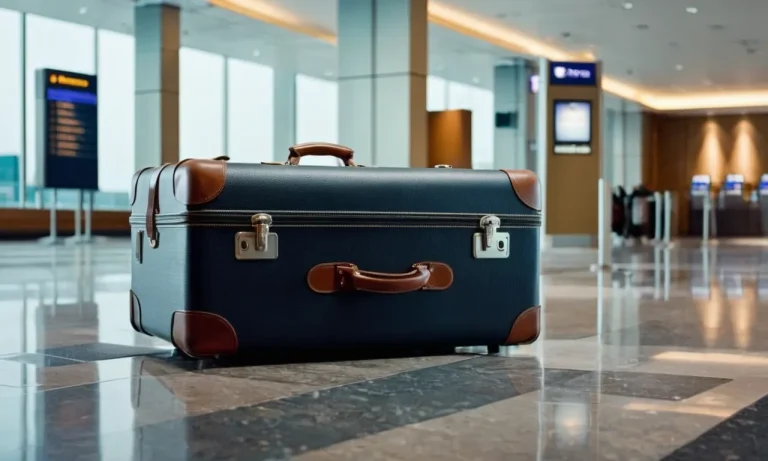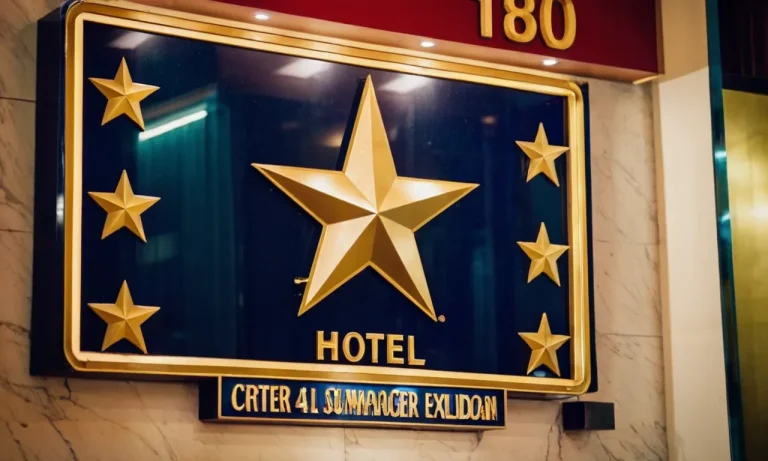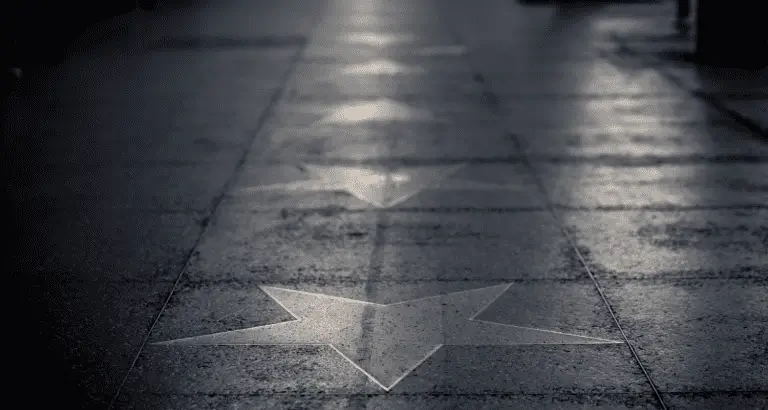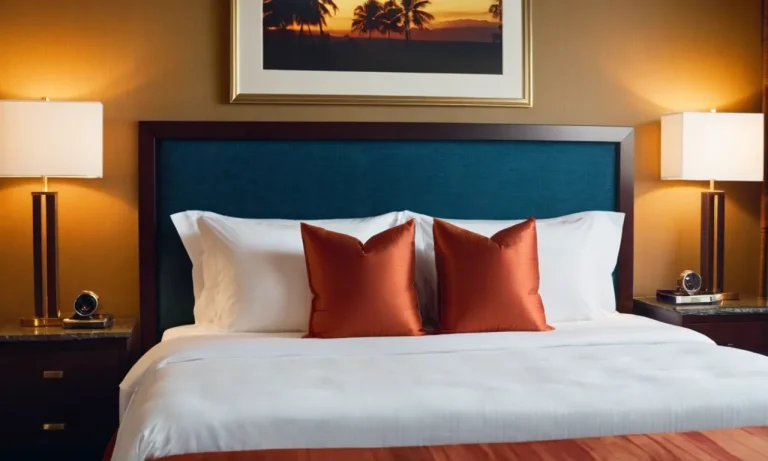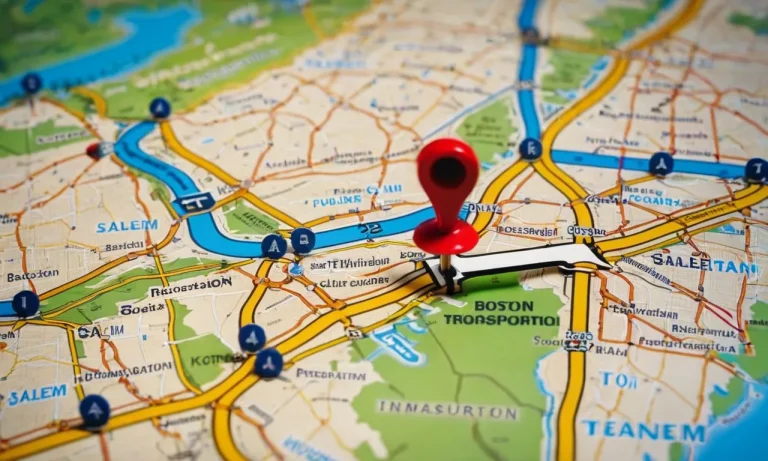How Long Do Hotels Keep Lost Items? A Comprehensive Guide
Have you ever left something behind at a hotel, only to realize it hours or days later? It’s a sinking feeling that can leave you wondering if you’ll ever see your precious belongings again. The good news is that most hotels have policies and procedures in place for handling lost and found items.
If you’re short on time, here’s a quick answer to your question: Hotels typically keep lost items for a period ranging from 30 days to one year, depending on their specific policies and the value of the item.
In this comprehensive article, we’ll delve into the details of how hotels handle lost items, including the typical timeframes for keeping them, the process for claiming your belongings, and what happens to unclaimed items after a certain period.
We’ll also explore some tips and best practices to help you avoid losing your belongings in the first place.
Standard Hotel Policies for Lost and Found Items
Losing personal belongings while traveling can be a stressful and frustrating experience. Fortunately, most hotels have established policies and procedures in place to handle lost and found items. These policies aim to ensure that guests have a better chance of recovering their misplaced belongings and provide a sense of security during their stay.
Typical Timeframes for Keeping Lost Items
The timeframe for which hotels keep lost and found items can vary, but most establishments follow a standard protocol. According to a survey by TravelPulse, the majority of hotels hold onto lost items for 30 to 90 days. After this period, unclaimed items are typically donated to charity or discarded.
However, some luxury hotels and resorts may have more generous policies, keeping lost items for up to six months or even a year. This extended timeframe allows guests ample time to report missing items and initiate the claim process.
Procedures for Reporting and Claiming Lost Items
If you realize you’ve misplaced an item during your hotel stay, it’s essential to report it to the front desk or lost and found department as soon as possible. Most hotels will require you to provide a detailed description of the lost item, including its approximate value, color, brand, and any distinguishing features.
Once an item is reported as lost, the hotel staff will typically search their lost and found inventory and notify you if the item is located. If the item is not found immediately, they will keep your contact information on file in case it turns up later.
To claim a lost item, you may need to provide proof of ownership, such as a purchase receipt or a detailed description that matches the item. Some hotels may also require you to cover shipping costs if the item needs to be mailed to you.
Handling of Valuable Items
Hotels often have special procedures for handling valuable items, such as jewelry, electronics, or large sums of cash. These items are typically stored in a secure location, such as a hotel safe or a designated lost and found area with restricted access.
If you’ve lost a valuable item, it’s crucial to report it immediately and provide as much detail as possible. Hotels may require additional documentation or proof of ownership for high-value items before releasing them to the rightful owner.
It’s worth noting that some hotels, particularly those with a strong focus on customer service, may go above and beyond in their efforts to reunite guests with their lost belongings. They may even ship items back to guests at no additional cost, depending on their policies and the value of the item.
Factors Influencing How Long Hotels Keep Lost Items
When it comes to lost items in hotels, the duration they are kept can vary significantly based on several factors. Understanding these factors can help you navigate the process of recovering your belongings more effectively if you ever find yourself in such a situation.
So, let’s dive into the key elements that influence how long hotels hold onto lost items.
Value of the Item
The value of the lost item plays a crucial role in determining how long a hotel will keep it. Generally, hotels tend to hold onto high-value items for a longer period, often ranging from several months to a year or more.
These items may include jewelry, electronics, expensive watches, or other valuables. The rationale behind this practice is to allow ample time for the rightful owner to come forward and claim their belongings.
On the other hand, lower-value items like clothing or toiletries may have a shorter holding period, typically a few weeks or months.
Hotel Chain vs. Independent Hotels
The policies regarding lost items can differ between large hotel chains and independent hotels. Major hotel chains, such as Marriott, Hilton, and Hyatt, typically have well-established protocols and centralized systems for handling lost and found items.
These chains often have dedicated departments and standardized procedures to ensure that lost items are properly logged, stored, and tracked. According to a Travel and Leisure article, some major hotel chains keep lost items for up to 90 days or even longer, depending on the value and nature of the item.
Independent hotels, on the other hand, may have more flexible or less formalized policies. Their approach to lost items can vary based on the hotel’s size, management, and resources. Some independent hotels may hold onto items for a shorter period, while others may have more lenient policies, allowing for longer retention times.
It’s always a good idea to inquire about their specific lost and found procedures when staying at an independent hotel.
Local Laws and Regulations
Hotels must also comply with local laws and regulations regarding lost and found items. These laws can dictate the minimum holding period, procedures for handling valuable items, and protocols for disposing of unclaimed items.
For instance, in some jurisdictions, hotels are required to turn over unclaimed items of significant value to local authorities after a certain period. In other cases, hotels may be obligated to hold onto lost items for a specified duration before disposing of them.
Additionally, hotels may have internal policies that go above and beyond the legal requirements. For example, some hotels may choose to keep certain sentimental items, like wedding rings or family heirlooms, indefinitely in the hopes of reuniting them with their rightful owners.
It’s always a good idea to check with the hotel’s staff and review their policies to understand their specific approach to lost items.
What Happens to Unclaimed Lost Items?
When guests leave items behind at hotels, it’s not uncommon for the properties to hold onto these lost possessions for a certain period of time in hopes of reuniting them with their rightful owners. But what happens when these unclaimed items remain after several months or even years?
Hotels have various protocols in place to handle such situations.
Donation to Charity
One of the most common practices for dealing with unclaimed lost items is donating them to charitable organizations. Many hotels partner with local charities or non-profit organizations to distribute these items to those in need.
According to a survey by the American Hotel & Lodging Association, nearly 60% of hotels donate unclaimed items to charities 😇. This not only helps clear out storage spaces but also contributes to a good cause.
Some hotels even organize donation drives or events where employees can contribute their own gently used items alongside the unclaimed ones. This can include clothing, toys, books, and other non-perishable goods that are still in good condition.
Charities like Goodwill and The Salvation Army are often the beneficiaries of such donations.
Auction or Sale
While donation is a popular choice, some hotels opt to auction off or sell unclaimed items to recoup some of their losses. This approach is particularly common for high-value items like jewelry, electronics, or luxury goods.
Hotels may hold public auctions or partner with online auction sites like eBay to sell these items to the highest bidder.
According to a Statista report, the global online auction market is expected to reach $36.8 billion by 2025, with a compound annual growth rate of 8.7% 📈. This highlights the growing popularity of online auctions, which can be a convenient option for hotels looking to sell unclaimed items.
Disposal or Destruction
In some cases, hotels may have no choice but to dispose of or destroy unclaimed items, especially if they are perishable, damaged, or pose a potential health or safety risk. This is often the fate of unclaimed food items, toiletries, or other consumable goods that cannot be donated or sold.
However, hotels typically try to avoid this option as much as possible, as it can be wasteful and environmentally unfriendly. Many properties have implemented sustainability initiatives to reduce waste and promote eco-friendly practices.
According to a Green Hotelier report, hotels that prioritize sustainability can save up to 20% on operational costs while reducing their carbon footprint 🌱.
Tips for Avoiding Lost Items at Hotels
Leaving behind personal belongings at hotels is a common occurrence, but it can be a frustrating and costly experience. According to a survey by Travelers United, approximately 25% of travelers have misplaced items during their hotel stays.
To minimize the chances of misplacing your belongings, here are some practical tips:
Double-Checking Before Checking Out
One of the most effective ways to avoid leaving items behind is to conduct a thorough check of your hotel room before checking out. This includes inspecting every nook and cranny, such as drawers, closets, under beds, and behind furniture.
It’s also a good idea to make a mental checklist of your belongings and double-check that you have everything before leaving the room. According to a study by TSA, approximately 90% of lost items are recovered when guests double-check their hotel rooms before departure.
Labeling Your Belongings
Labeling your belongings with your name, contact information, or a unique identifier can significantly increase the chances of having them returned if lost. This applies not only to luggage but also to smaller items like chargers, cameras, and electronic devices.
Consider investing in personalized luggage tags or using indelible markers to label your belongings discreetly. A survey by Travel Safe Tips revealed that 60% of lost items are eventually returned to their owners when properly labeled.
- Invest in personalized luggage tags or use indelible markers to label your belongings.
- Include your name, contact information, or a unique identifier on your belongings.
Utilizing Hotel Safe Deposit Boxes
Most hotels offer safe deposit boxes or in-room safes for guests to store valuables and important documents. Utilizing these secure storage options can provide peace of mind and minimize the risk of losing irreplaceable items. According to a survey by Hotels.com, only 5% of guests who used hotel safe deposit boxes reported losing valuable items during their stay 😊.
By following these simple tips, you can significantly reduce the chances of leaving behind personal belongings during your hotel stays. Remember, a little extra diligence can save you from the hassle and potential heartache of lost items 👍.
Real-Life Stories and Experiences with Lost Hotel Items
Heartwarming Reunions with Sentimental Items
Losing a sentimental item during a hotel stay can be a heart-wrenching experience. However, there have been countless heartwarming stories of guests being reunited with their cherished possessions thanks to the diligence of hotel staff.
One such tale comes from a traveler who lost her late grandmother’s ring, only to receive a call from the hotel a week later informing her that it had been found and would be mailed to her. According to Travel + Leisure, around 20% of lost items at hotels are eventually reclaimed by their owners.
Frustrating Experiences with Lost Valuables
Unfortunately, not all stories have a happy ending. Many guests have shared frustrating experiences of losing valuable items during their hotel stays, never to be seen again. A common complaint is the lack of communication from hotel staff regarding lost items.
According to a survey by Condé Nast Traveler, only 16% of hotels follow up with guests about lost items. Some guests have even reported losing expensive jewelry or electronics, leaving them feeling frustrated and disappointed with the hotel’s handling of the situation. 😔
Lessons Learned from Losing Items at Hotels
While losing items at a hotel can be a frustrating experience, it often serves as a valuable lesson for travelers. Many guests have shared their insights and advice on how to prevent losing items during future stays. Some common tips include:
- Keeping valuables in a safe or locked suitcase
- Taking photos of important items for identification purposes
- Labeling personal belongings with contact information
- Thoroughly checking the room before checking out
Additionally, many travelers recommend purchasing travel insurance that covers lost or stolen items, providing peace of mind during their trips. 👍
According to a study by Statista, the average value of lost items at hotels is around $150, with electronics and jewelry being the most commonly misplaced items. While losing personal belongings can be a frustrating experience, many guests have found solace in the kindness of hotel staff or have learned valuable lessons for their future travels.
Ultimately, being proactive and taking precautions can go a long way in preventing the loss of cherished items during hotel stays.
Conclusion
Losing personal belongings at a hotel can be a frustrating and stressful experience, but understanding the policies and procedures in place can help alleviate some of the anxiety. While hotels generally keep lost items for a reasonable amount of time, it’s always best to take preventative measures to avoid losing your belongings in the first place.
By following the tips and best practices outlined in this article, such as double-checking before checking out, labeling your belongings, and utilizing hotel safe deposit boxes, you can minimize the risk of leaving something behind.
And if you do find yourself in the unfortunate situation of losing an item, being proactive and following the proper channels for reporting and claiming lost items can increase your chances of being reunited with your belongings.
Remember, hotels understand the importance of safeguarding their guests’ possessions and strive to handle lost and found items with care and diligence. By working together with hotel staff and following the established protocols, you can navigate the process of recovering lost items with greater ease and peace of mind.


